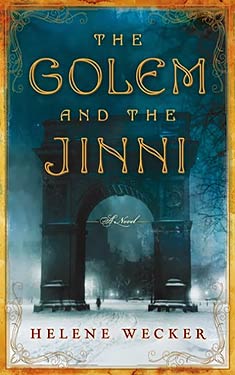Helene Wecker
Completed 4/16/2014, Reviewed 4/28/2014
5 stars
What do you get when you drop two Old World mythological
creatures in the ethnic ghettos of 1899 Manhattan and try assimilate them into
the existing culture? You get a beautifully
written study of the immigrant experience at the height of the influx of new
peoples into the US, with a little magic and superpower thrown in for fun.
 A jinni is trapped in a lamp for centuries. The lamp finds its way to Little Syria in New
York City at the turn of the 19th century. A metalworker tries to
make some minor repairs to the lamp, releasing the jinni, who has no memory of
why and to whom he is bound. The
tinsmith offers him a place to stay and work in his shop, and tries to help the
jinni control his powers and temper so as not to stand out in their ethnic
ghetto.
A jinni is trapped in a lamp for centuries. The lamp finds its way to Little Syria in New
York City at the turn of the 19th century. A metalworker tries to
make some minor repairs to the lamp, releasing the jinni, who has no memory of
why and to whom he is bound. The
tinsmith offers him a place to stay and work in his shop, and tries to help the
jinni control his powers and temper so as not to stand out in their ethnic
ghetto.
At the same time, a European Jewish man employs a sinister
rabbi to create the perfect wife for him, in the form of a golem. The man doesn’t bring the golem to life until
they are aboard a ship bound for America.
The man dies, and the golem is left masterless as she lands at Ellis
Island. A friendly, old rabbi befriends
her and tries to help her suppress her superhuman strength and perceptions and assimilate
into their ghetto. The two eventually
meet, first becoming each other’s confidantes, and then friends, trying to find
their place in the New World.
The first thing that jumped out at me was the prose. The book is gorgeously written. It has the same feel as some of my favorite works,
such as Mary Doria Russell’s “The Sparrow” and Clifford D. Simak’s “Way
Station”. Wecker evokes not only the
look of the ethnic gettos at the turn of 19th century New York City,
but also their insular feel. Sprinkled
throughout the book, you also learn the back story of how the jinni was
captured by an evil wizard and trapped in the lamp. The descriptions of the desert, the nomads,
and his glass palace are simply stunning.
The characters are also incredibly realized. The golem, Chava, is introverted, afraid of
people, and afraid of herself. She is
made of clay and has superhuman strength.
She only wants to sink into the background noise of the Jewish community. Ahmed, the jinni, is a being of fire and
magic. He wants freedom, to be and go as
he wishes, regardless of the consequences.
They make an unlikely pair, but find comfort in that they are both
ancient supernatural creatures in a strange, modern place. Although the two are filled magic and power,
it’s the human connection between the two that fleshes these characters out so
well.
The supporting characters are also wonderful. The sinister rabbi is, using one of my
favorite phrases, deliciously evil. The other
rabbi, in contrast, is marvelously kind, a counterpoint to the evil one. And the ghettos are populated with other
colorful characters that breathe life into the setting.
Besides the story of assimilation at the turn of the
century, it is also about a relationship between Arab and Jew. The author acknowledges that there’s some of
her relationship with her husband in Chava and Ahmed. It doesn’t go into the details of the modern
conflict between the two peoples. More generally, it shows the challenges in understanding
between two people who basically come from the same place, but with two very
different perspectives.
When I first saw this book on the shelves of the bookstore I
was immediately drawn to it. When I
bought it, I was trying to finish an 800 page monster of a book. It took me so long to get to it, I was
worried I was building too much anticipation and would be terribly disappointed. I wasn’t.
It was everything I hoped it would be.
This was my most satisfying read so far this year. 5 stars
I'm so happy to find another blogger who liked this book! I found the two characters very well drawn and intriguing. Also they seem to complement each other, the golem's quietness to the djinni's recklessness. Definitely one of the best books of the year for me as well.
ReplyDeleteThis seems to be getting a lot of favourable attention (also read Delia's very positive review). I'll have to pick up a copy.
ReplyDeleteThanks
Lynn :D